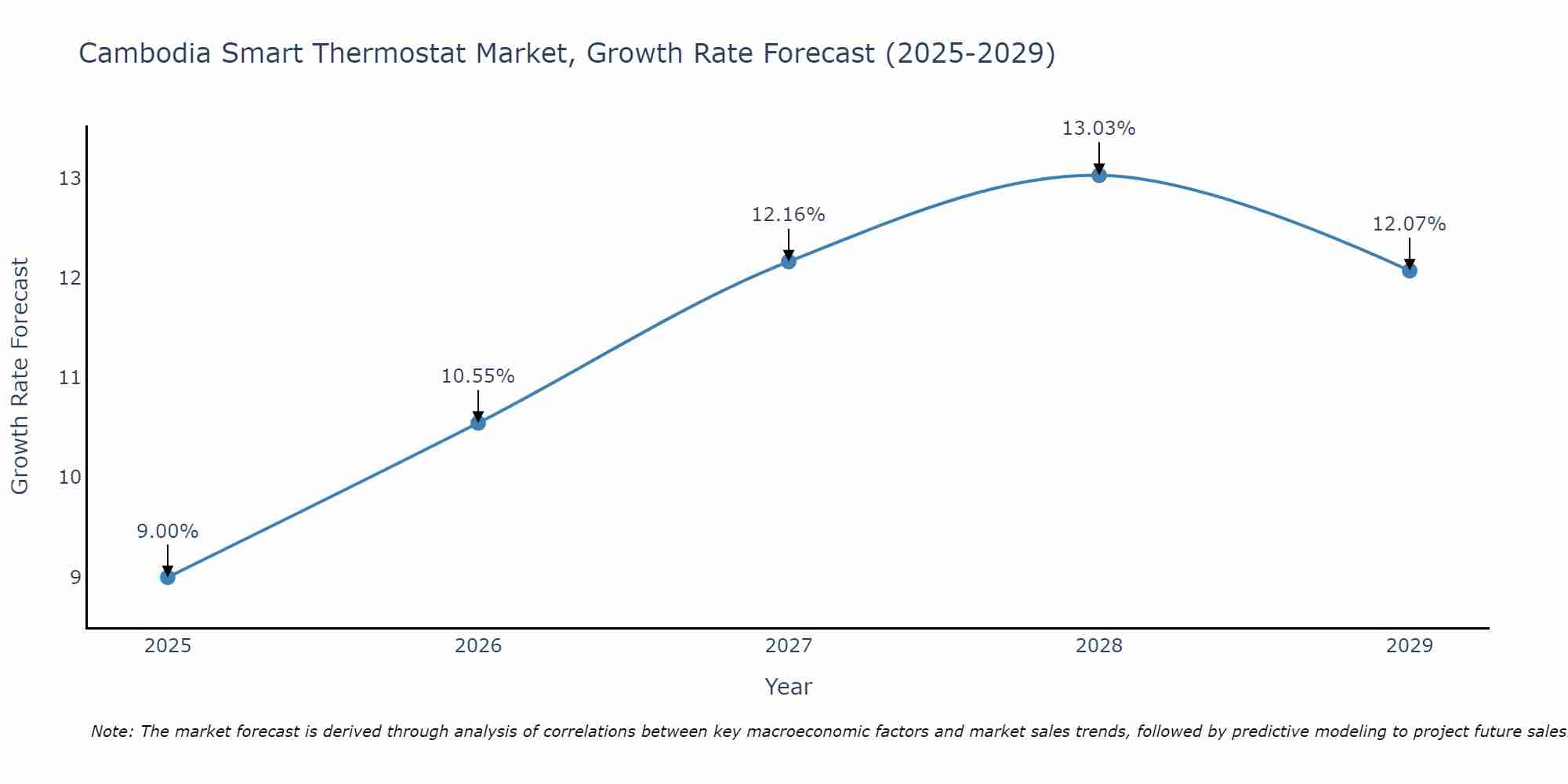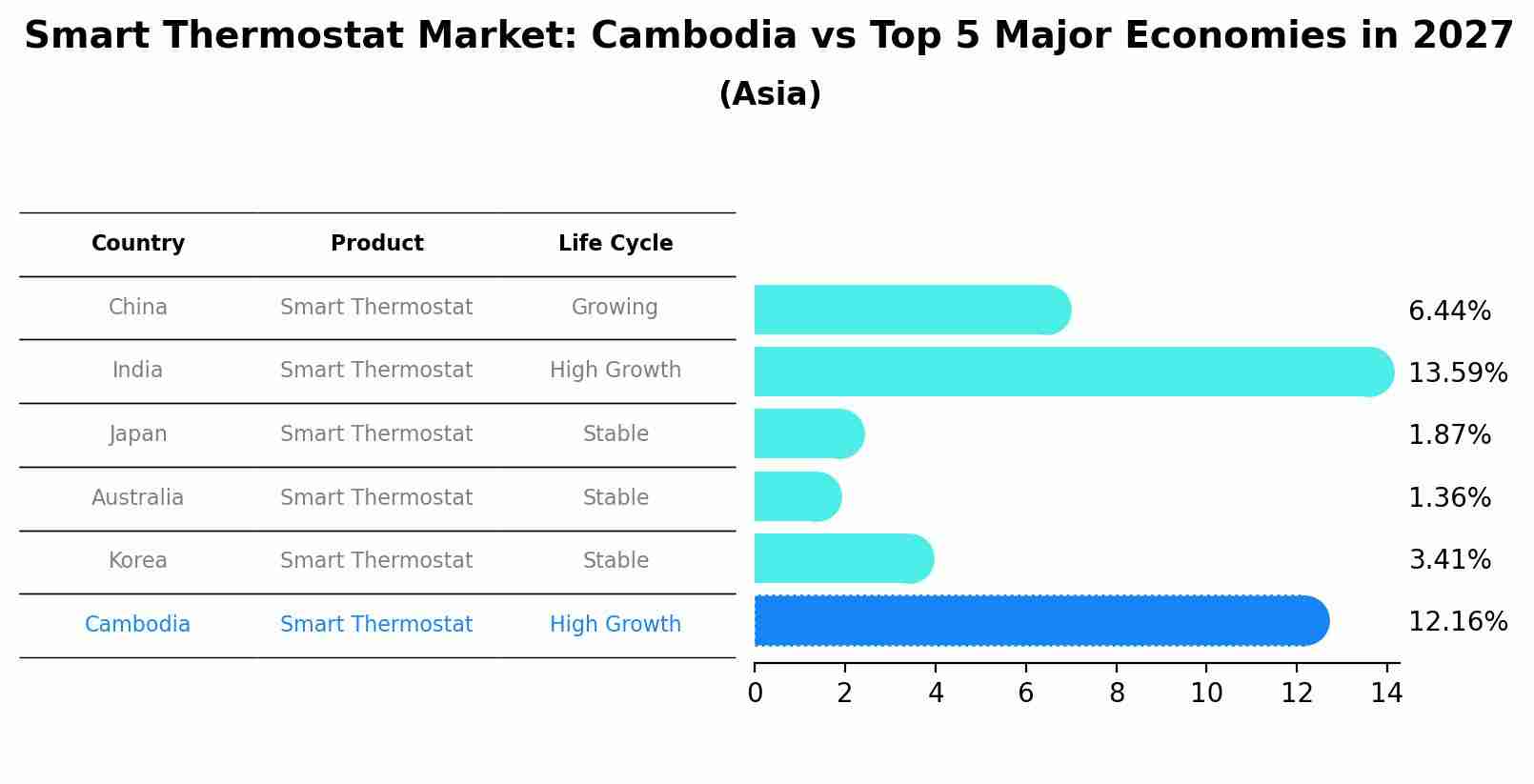Cambodia Smart Thermostat Market (2025-2031) Outlook | Revenue, Analysis, Companies, Industry, Growth, Trends, Share, Value, Size & Forecast
| Product Code: ETC369513 | Publication Date: Aug 2022 | Updated Date: Jul 2025 | Product Type: Market Research Report | |
| Publisher: 6Wresearch | Author: Sumit Sagar | No. of Pages: 75 | No. of Figures: 35 | No. of Tables: 20 |
Cambodia Smart Thermostat Market Size Growth Rate
The Cambodia Smart Thermostat Market is projected to witness mixed growth rate patterns during 2025 to 2029. Growth accelerates to 13.03% in 2028, following an initial rate of 9.00%, before easing to 12.07% at the end of the period.

Smart Thermostat Market: Cambodia vs Top 5 Major Economies in 2027 (Asia)
Cambodia's Smart Thermostat market is anticipated to experience a high growth rate of 12.16% by 2027, reflecting trends observed in the largest economy China, followed by India, Japan, Australia and South Korea.

Cambodia Smart Thermostat Market Synopsis
The Cambodia Smart Thermostat Market is witnessing steady growth driven by increasing awareness of energy efficiency and the growing adoption of smart home technologies in the country. Smart thermostats offer users the ability to remotely control and schedule their heating and cooling systems, leading to cost savings and reduced energy consumption. The market is primarily dominated by international brands such as Nest, Ecobee, and Honeywell, with local players also entering the fray. Factors such as rising disposable income, government initiatives promoting sustainability, and the increasing focus on smart building solutions are expected to further propel the growth of the smart thermostat market in Cambodia. As consumers become more tech-savvy and environmentally conscious, the demand for smart thermostats is likely to continue on an upward trajectory.
Cambodia Smart Thermostat Market Trends
The Cambodia Smart Thermostat Market is witnessing significant growth due to the increasing adoption of smart home technologies and the rising awareness of energy efficiency. Consumers are increasingly seeking ways to control and monitor their home`s temperature remotely, leading to a growing demand for smart thermostats that offer convenience and energy savings. The market is also benefiting from the government`s initiatives to promote energy conservation and the development of smart cities. Key trends in the Cambodia Smart Thermostat Market include the integration of artificial intelligence and machine learning capabilities, the rise of voice-controlled devices, and the expansion of smart home ecosystems. As more Cambodian households embrace smart technologies, the market is expected to continue expanding in the coming years.
Cambodia Smart Thermostat Market Challenges
In the Cambodia Smart Thermostat Market, challenges are primarily related to low awareness and adoption rates due to limited consumer knowledge about the benefits of smart thermostats. Additionally, the high initial cost of smart thermostats compared to traditional thermostats poses a barrier to widespread adoption in a price-sensitive market like Cambodia. The lack of standardized regulations and infrastructure for smart home technology also hinders market growth. Furthermore, concerns around data privacy and security may impact consumer trust in smart thermostat devices. To overcome these challenges, companies operating in the Cambodia Smart Thermostat Market need to focus on educating consumers about the energy-saving potential of smart thermostats, offering competitive pricing strategies, collaborating with government bodies to establish regulations, and implementing robust security measures to address privacy concerns.
Cambodia Smart Thermostat Market Investment Opportunities
The Cambodia Smart Thermostat Market presents promising investment opportunities due to the increasing adoption of smart home technologies and the growing demand for energy-efficient solutions. With rising awareness about environmental sustainability and the need for cost-effective energy management, there is a growing market for smart thermostats that offer remote control, energy-saving features, and customization options. Investing in the Cambodia Smart Thermostat Market can be lucrative as the government encourages energy efficiency initiatives and modernization of infrastructure. Additionally, partnerships with local distributors and retailers can help penetrate the market effectively. Overall, the Cambodia Smart Thermostat Market offers a favorable environment for investors looking to capitalize on the rising trend of smart home technologies and sustainable living practices.
Jordan Agar Market Government Policies
The Cambodian government has been actively promoting energy efficiency through various policies related to the smart thermostat market. The Ministry of Mines and Energy has introduced initiatives to encourage the adoption of smart thermostats in residential and commercial buildings to reduce energy consumption and lower carbon emissions. These policies include offering incentives such as tax benefits and subsidies for purchasing energy-efficient appliances, as well as implementing building codes that require the installation of smart thermostats in new constructions. Additionally, the government has been working with utility companies to provide smart thermostat rebates and promote energy-saving programs to raise awareness and drive demand for these technologies in Cambodia.
Cambodia Smart Thermostat Market Future Outlook
The Cambodia Smart Thermostat Market is poised for significant growth in the coming years due to the increasing demand for energy-efficient solutions and smart home technologies. Factors such as rising disposable income, growing awareness about climate change, and government initiatives promoting sustainable living are driving the adoption of smart thermostats in the country. Additionally, the rapid urbanization and expanding middle-class population are creating a favorable environment for the smart home market to flourish. With advancements in IoT technology and the increasing focus on energy conservation, the Cambodia Smart Thermostat Market is expected to witness a steady increase in demand as more consumers seek innovative ways to manage their energy consumption and enhance their living standards.
Key Highlights of the Report:
- Cambodia Smart Thermostat Market Outlook
- Market Size of Cambodia Smart Thermostat Market, 2024
- Forecast of Cambodia Smart Thermostat Market, 2031
- Historical Data and Forecast of Cambodia Smart Thermostat Revenues & Volume for the Period 2021 - 2031
- Cambodia Smart Thermostat Market Trend Evolution
- Cambodia Smart Thermostat Market Drivers and Challenges
- Cambodia Smart Thermostat Price Trends
- Cambodia Smart Thermostat Porter's Five Forces
- Cambodia Smart Thermostat Industry Life Cycle
- Historical Data and Forecast of Cambodia Smart Thermostat Market Revenues & Volume By Type for the Period 2021 - 2031
- Historical Data and Forecast of Cambodia Smart Thermostat Market Revenues & Volume By Wireless for the Period 2021 - 2031
- Historical Data and Forecast of Cambodia Smart Thermostat Market Revenues & Volume By Wireless for the Period 2021 - 2031
- Historical Data and Forecast of Cambodia Smart Thermostat Market Revenues & Volume By End-User Vertical for the Period 2021 - 2031
- Historical Data and Forecast of Cambodia Smart Thermostat Market Revenues & Volume By Residential for the Period 2021 - 2031
- Historical Data and Forecast of Cambodia Smart Thermostat Market Revenues & Volume By Commercial for the Period 2021 - 2031
- Cambodia Smart Thermostat Import Export Trade Statistics
- Market Opportunity Assessment By Type
- Market Opportunity Assessment By End-User Vertical
- Cambodia Smart Thermostat Top Companies Market Share
- Cambodia Smart Thermostat Competitive Benchmarking By Technical and Operational Parameters
- Cambodia Smart Thermostat Company Profiles
- Cambodia Smart Thermostat Key Strategic Recommendations
Frequently Asked Questions About the Market Study (FAQs):
- Single User License$ 1,995
- Department License$ 2,400
- Site License$ 3,120
- Global License$ 3,795
Search
Thought Leadership and Analyst Meet
Our Clients
Related Reports
- Canada Oil and Gas Market (2026-2032) | Share, Segmentation, Value, Industry, Trends, Forecast, Analysis, Size & Revenue, Growth, Competitive Landscape, Outlook, Companies
- Germany Breakfast Food Market (2026-2032) | Industry, Share, Growth, Size, Companies, Value, Analysis, Revenue, Trends, Forecast & Outlook
- Australia Briquette Market (2025-2031) | Growth, Size, Revenue, Forecast, Analysis, Trends, Value, Share, Industry & Companies
- Vietnam System Integrator Market (2025-2031) | Size, Companies, Analysis, Industry, Value, Forecast, Growth, Trends, Revenue & Share
- ASEAN and Thailand Brain Health Supplements Market (2025-2031) | Strategy, Consumer Insights, Analysis, Investment Trends, Opportunities, Growth, Size, Share, Industry, Revenue, Segments, Value, Segmentation, Supply, Forecast, Restraints, Outlook, Competition, Drivers, Trends, Demand, Pricing Analysis, Competitive, Strategic Insights, Companies, Challenges
- ASEAN Bearings Market (2025-2031) | Strategy, Consumer Insights, Analysis, Investment Trends, Opportunities, Growth, Size, Share, Industry, Revenue, Segments, Value, Segmentation, Supply, Forecast, Restraints, Outlook, Competition, Drivers, Trends, Demand, Pricing Analysis, Competitive, Strategic Insights, Companies, Challenges
- Europe Flooring Market (2025-2031) | Outlook, Share, Industry, Trends, Forecast, Companies, Revenue, Size, Analysis, Growth & Value
- Saudi Arabia Manlift Market (2025-2031) | Outlook, Size, Growth, Trends, Companies, Industry, Revenue, Value, Share, Forecast & Analysis
- Uganda Excavator, Crane, and Wheel Loaders Market (2025-2031) | Strategy, Consumer Insights, Analysis, Investment Trends, Opportunities, Growth, Size, Share, Industry, Revenue, Segments, Value, Segmentation, Supply, Forecast, Restraints, Outlook, Competition, Drivers, Trends, Demand, Pricing Analysis, Competitive, Strategic Insights, Companies, Challenges
- Rwanda Excavator, Crane, and Wheel Loaders Market (2025-2031) | Strategy, Consumer Insights, Analysis, Investment Trends, Opportunities, Growth, Size, Share, Industry, Revenue, Segments, Value, Segmentation, Supply, Forecast, Restraints, Outlook, Competition, Drivers, Trends, Demand, Pricing Analysis, Competitive, Strategic Insights, Companies, Challenges
Industry Events and Analyst Meet
Whitepaper
- Middle East & Africa Commercial Security Market Click here to view more.
- Middle East & Africa Fire Safety Systems & Equipment Market Click here to view more.
- GCC Drone Market Click here to view more.
- Middle East Lighting Fixture Market Click here to view more.
- GCC Physical & Perimeter Security Market Click here to view more.
6WResearch In News
- Doha a strategic location for EV manufacturing hub: IPA Qatar
- Demand for luxury TVs surging in the GCC, says Samsung
- Empowering Growth: The Thriving Journey of Bangladesh’s Cable Industry
- Demand for luxury TVs surging in the GCC, says Samsung
- Video call with a traditional healer? Once unthinkable, it’s now common in South Africa
- Intelligent Buildings To Smooth GCC’s Path To Net Zero


















